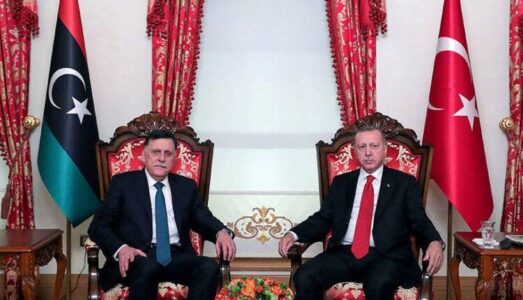
Turkey will send 2,500 members of the Tunisian branch of the Islamic State to Libya in a few months
Turkey is continuing its belligerent campaign in Libya in favour of the Government of National Accord (GNA) of Prime Minister Fayez Sarraj, which is facing the Libyan National Army (LNA) of Marshal Khalifa Haftar in the civil war that has been raging in the North African country since 2014.
Now there are reports from the Syrian Observatory for Human Rights (SOHR), a UK-based organization with a large network of field reporters in Syria, that the nation headed by Recep Tayyip Erdogan has sent 2,500 members of the Daesh branch in Tunisia to Libya in recent months.
By order of the Government, Turkish intelligence has transferred jihadist groups and Daesh members of different foreign nationalities from Syria to Libya in recent months. According to the SOHR, Ottoman intelligence assigned 2,500 members of the Tunisian Daesh group to Libya, out of the thousands of other Tunisians from the jihadist group operating in Syria, a Middle Eastern country in which another civil war is taking place, involving Turkey, which is reported to be cooperating with paid terrorist elements on their behalf.
According to the data handled by the SOHR, the number of troops who arrived in Libya increased to 16,100 Syrian mercenaries, including 340 children under 18, of whom 5,600 returned to Syria after completing their contracts and obtaining their salaries. Meanwhile, Turkey continues to recruit more mercenaries who are brought to Turkish soil for military training.
According to SOHR sources, commanders of Turkish-backed factions embezzle the emoluments assigned to combatants, which has led to great unrest among the ranks of mercenaries and some defections. In this regard, the monthly salaries assigned to paid soldiers are higher than what they eventually receive.
Meanwhile, the number of Syrian mercenaries backed by Turkey who were killed in military operations in Libya has increased to almost 470, including 33 under 18 years of age, as well as some commanders of the detachment.
Turkey actively participates in the wars in Libya and Syria with the clear objective of obtaining a better geostrategic position and to achieve greater financial resources linked to the exploitation of oil and gas resources in the Mediterranean arc. This intervention makes use of the use of mercenaries in the pay of various nationalities coming from Syrian territory, some of them linked to former groups linked to jihadist organizations such as Daesh and Al-Qaeda.
Recently, there has also been speculation that the Eurasian country might also send officials from Somalia to Libya to support the GNA.
It is worth remembering that in November 2019 Turkish President Recep Tayyip Erdogan and Prime Minister Fayez Sarraj signed an agreement guaranteeing Turkish military support to the GNA, internationally recognized by the UN since 2016 and based in the capital of Tripoli, opposite the LNA in Haftar, linked to the other eastern executive in Tobruk; a pact by which the distribution of exclusive economic zones in the Mediterranean also took place, which provoked the protest of countries like Greece and Cyprus when they considered that their maritime borders were being violated.
This Sunday’s visit by the Turkish Defence Minister, Hulusi Akar, to Qatar to meet with Emir Tamim bin Hamad al-Thani probably dealt with this issue of the intervention in Libya. And here may lie the key to the possible dispatch of Somali officers to the North African country, since Doha is a base for the military training of Somali commanders and a starting point for the transfer of fighters to conflict zones in the Middle East.
Libya Review has referred to a report that several Somali intelligence officers were receiving training in the Qatari capital with the aim of expanding the influence of the Gulf monarchy on the African continent. According to this media, Turkey seriously values the sending of officers from Somalia to support the GNA in a war like the Libyan one, which has become an international game board with the participation of foreign powers in favour of the confronted factions to try to make profits from the situation.
In this sense, on the one hand, the Tripoli government is supported by Turkey, Qatar and Italy; while, on the other hand, the LNA is supported by Saudi Arabia, Egypt, the Emirates (all of them regional rivals of Qatar), Russia and France.
This latest information comes just as the United States Pentagon has recently confirmed that Turkey stationed between 3,500 and 3,800 Syrian mercenaries in Libya in the first three months of the year.
Source: SOH





